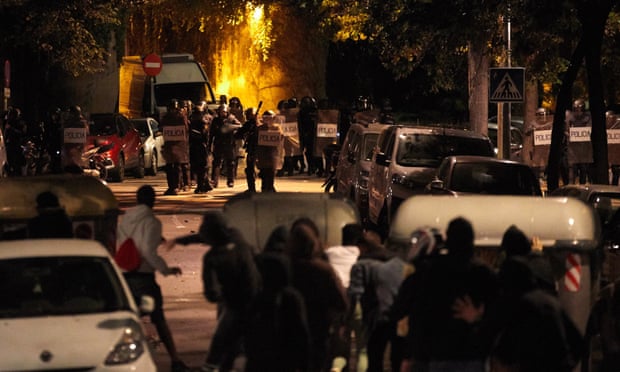The Catalan president, Quim Torra, has condemned the violent protests that have erupted across the region this week but blamed the unrest on “infiltrators” seeking to undermine the peaceful image of the pro-independence movement.
The violence, which began on Monday night after the Spanish supreme court jailed nine pro-independence leaders over their roles in the failed push for secession two years ago, escalated sharply on Wednesday night.
Cars were set on fire and Catalan police said molotov cocktails were thrown and officers attacked with stones, acid, fireworks and slingshots.
Eighty people, including 46 police officers, were injured overnight and 33 people arrested, according to the Spanish authorities.
Torra, who had been facing calls to issue an unequivocal condemnation of the violence, appealed for peaceful protests in a televised address shortly after midnight.
“This has to stop right now,” he said. “There is no reason or justification for burning cars, nor any other vandalism. Protest should be peaceful.”
But he claimed the violence was down to individuals trying to damage the reputation of the independence movement.
“We cannot allow such groups who infiltrate and provoke to harm the image of a movement which counts millions of Catalans,” he said.
Speaking in the regional parliament on Thursday morning, Torra remained defiant, describing the supreme court’s decision to jail the nine leaders for sedition and misuse of public funds as “ignominious”.
He also suggested that another unilateral independence referendum should be held, adding: “If we have been sentenced to 100 years in prison for putting out the ballot boxes, the response is clear: we’ll have to put them out again for self-determination.”
The Catalan president has been criticised for calling for civil disobedience while sending in Catalan riot police to restore order.
On Wednesday afternoon, Torra had tweeted, “Violence does not represent us”, but had gone no further despite two nights of vandalism and skirmishes between protesters and police and an attempt to occupy Barcelona-El Prat airport.
Spain’s prime minister, Pedro Sánchez had urged him to issue a clear condemnation of the violence.
Referring to the regional government’s unsuccessful attempts to secure independence, Sánchez added: “No leader can camouflage their failure behind curtains of smoke and fire.”
Earlier on Wednesday, the jailed leaders had issued a joint plea for peaceful protests after the Spanish government warned any further violence would be met with a “firm, proportional and united” response.
“All support to mobilisations and massive and peaceful marches,” wrote the nine, who include the former regional vice-president Oriol Junqueras and two influential grassroots leaders, Jordi Sànchez and Jordi Cuixart. “No violence represents us.”
Thousands of people have also been marching peacefully since Wednesday towards the regional capital, Barcelona, where students are striking and which trade unions are planning to join on Friday.
Sánchez’s political opponents are urging him to take a tough line on the Catalan unrest, but the prime minister has said that a blunt response would only make things worse.
Speaking on Wednesday evening after holding talks with other political party leaders, Sánchez said the government would defend Spain’s constitution and peaceful coexistence but would not be tempted into inflaming tensions.
“The state will always guarantee the rights of those who wish to protest their ideas peacefully,” he said.
“But organised violent groups and those who try to break democratic laws will not achieve their aims … The only hope of those violent groups is that we’ll make mistakes and become overexcited and divided. They want us to fall for their provocations and feed a violent spiral.”
Sánchez’s caretaker government has already said it could activate article 155 of the constitution, which would allow it to suspend the regional government and assume direct rule of the region.
The conservative People’s party (PP) and the centre-right Citizens party want firm and immediate action.
The PP leader, Pablo Casado, has accused Sánchez of “a lack of foresight” and called for the activation of the national security law, which would bring the Catalan regional police force under the control of the central government.
Albert Rivera, the leader of the Citizens party, said “the government needs to act now or we’re going to see a lot of awful problems”.
Catalonia has returned to the top of the political agenda as Spain prepares to go to the polls for the fourth time in as many years on November 10.
Although Sánchez’s socialist party won the most votes in April’s general election, it proved unable to form a government, triggering a fresh vote.
The last election was called after Catalan pro-independence parties joined forces with their bitter enemies in the PP and Citizens to torpedo Sánchez’s national budget.
Sánchez’s opponents accuse him of being too beholden to the Catalan pro-independence parties who supported his successful bid to throw the PP out of office with a vote of no confidence.
However, the acting prime minister has repeatedly said he will not allow a referendum on Catalan independence and warned that the Spanish constitution must be respected.








































admin in: How the Muslim Brotherhood betrayed Saudi Arabia?
Great article with insight ...
https://www.viagrapascherfr.com/achat-sildenafil-pfizer-tarif/ in: Cross-region cooperation between anti-terrorism agencies needed
Hello there, just became aware of your blog through Google, and found ...